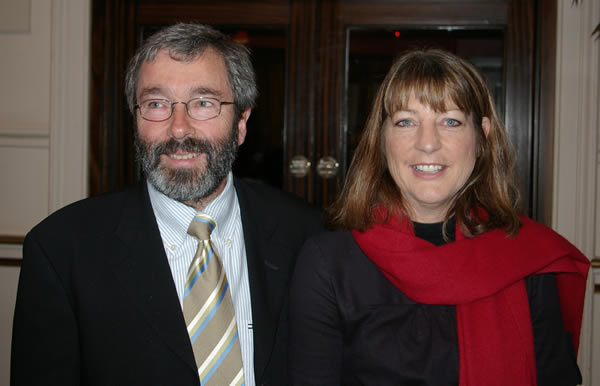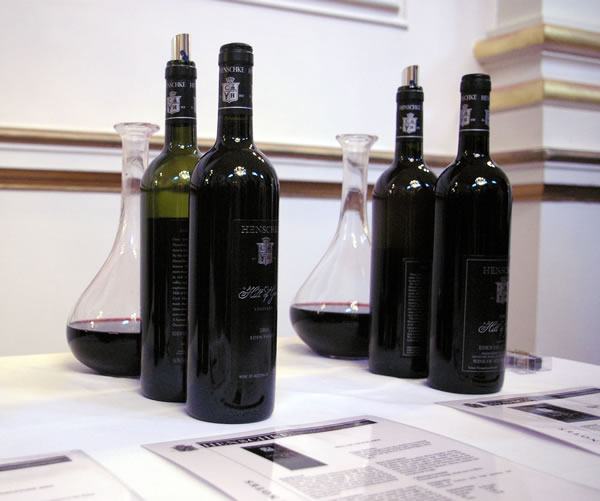|
The
wines of Henschke,
Barossa, Australia
Sustaining a heritage, with a biodynamic twist
CA Henschke & Co, PO
Box 100 Keyneton, South Australia 5353
Tel: +61 8 8564 8223
Website: www.henschke.com.au

Stephen
and Prue Henschke
Henschke is a fifth
generation winery, with the sixth generation now coming to the fore.
The vineyards date back to the 1860s, which is almost as far as
Australian vitculture goes. The first family vines were planted in
1861 in Keyneton by Johann Christian Henschke, a migrant from Silesia.
It’s currently run by the dynamic winemaker and viticultralist
pairing of husband and wife team Stephen and Prue Henschke.
After trialling organics,
Prue and Stephen have decided to go fully organic, including the
adoption of some biodynamic practices. They explained what this blend
of sustainability looks like in practice.
Hill of Grace is the most famous vineyard. It's a 9
hectare block with five different soil types, including the celebrated
grandfather vines dating back 120 years. Mount Edelstone is another
old vineyard of the Henschkes, planted in 1912, and consisting of 16.5
hectares. It's quite high vigour, with deep red brown earth over
gravel. The trellis style here has been changed from the traditional
single-wire 'umbrella' to Scott Henry (a split canopy system) to cope
with the vigour, and is planted east to west so that the face of the
vine rows get the northern sun.
One of the problems facing organic growers has been
the control of under-row weeds, which is achieved in conventional
vineyards by the use of herbicides. Under-vine weed control in the
Henschke vineyards has been switched from herbicides to pine oil in
the winter, and then in the summer an under-vine ploughing device
which takes out weeds without damaging the vines is used. In addition,
in some of the vineyard blocks a permanent sward is left in the
vineyard with straw mulch under the vines, deterring weed growth and
helping to maintain soil moisture.
The Henschkes practice a schedule of organic sprays.
These include Bacillus thuriengensis, copper and sulfur (which
they are moving away from), bicarbonate (Ecocarb) and canola oil (for
control of powdery mildew). In bullet-point form, here are some of the
other sustainable/organic/biodynamic practices they are putting into
place.
- The
Keyneton home vineyards use recycled water from winery effluent
dams.
- Stalks
and skins are recycled in a compost pad.
- Regeneration
patches have been planted to native vegetation, 'We're trying to
cover up what our forefathers removed', explains Pru. Part of the
organic schedule is that 5% of landholding is returned to native
vegetation, but Pru says that her target is 20%. There are native
cypress pines in the vineyards.
- Soil
is protected with native plant swards, such as wallaby grass (Danthonia
sp.) and saltbush, which encourages beneficial insects.
- Mulch
is used to conserve the moisture in the soils.
- They
are moving away from wooden fence posts in the vineyard because of
problems with contamination of the soil by CCA – plastic is
being used instead.
Composting is being done by the biodynamic process,
with different layers. One of the growers Henschke use has a dairy,
which is a source of manure. BD500 is spread out as a soil
conditioner. Prue doesnt have to make her own biodynamic preparations.
'We can just send away for BD500 and it is delivered in three days,'
she says.
'We're looking for management systems that help the
health of the soils, and help them retain moisture', explains Prue.
'The soil components are manufactured by the microbes in the soil:
they need food and the right conditions'. She adds that, 'for me it is
not marketing – it is survival.'
'We are combining organics and biodynamics to give
an integrated system', she explains. This sort of fusion of
sustainable wine growing, organics and selected biodynamic practices
strikes me as an enlightened, rational approach, although it would
probably be frowned upon by purist followers of biodynamics.
Stephen Henschke emphasizes this point. 'We are
looking at biodynamics from a scientific point of view', he says. 'We
look at soil microbes, beneficial insects and so on, rather than
seeing it as a religion'.
It's not just the vineyards that are old: the winery
also dates back to the 1860s. Traditional and 'natural' winemaking
practices are employed by the Henschkes. The reds are fermented in
open-top fermenters with the cap submerged by boards. The submerged
cap gives gentle extraction of softer, silkier tannins. However,
cultured yeasts are used, which biodynamic practitioners would find
worrying. Towards the end of fermentation the reds are transferred
warm to American and French oak barrels, where they remain for some
time (two years in the case of Hill of Grace).

The
wines
Henschke Tilly’s Vineyard 2006 Barossa
A blend of Semillon, Chardonnay and Sauvignon Blanc. Fruity, crisp
and quite full with a mineralic edge and a hint of reduction. The
palate is crisp and fresh with nice fruitiness. A brightly fruited
style with lots of personality. 87/100
Henschke Louis Semillon 2006 Eden Valley
Wonderfully bright, limey, minerally nose is complex and striking.
The palate is fresh, persistent and has lemony complexity with a
strongly mineral character. Stylish and delicious. 91/100
Henschke Croft Chardonnay 2006 Lenswood, Adelaide
Hills
Very classy nutty, vanilla-edged nose with bright fruit to the
fore. The palate is fresh and tight with a sophisticated character,
good acidity and careful oak use. 91/100
Henschke Innes Pinot Gris 2006 Littlehampton,
Adelaide Hills
Some nice richness to the nose, which is rounded and grapey with a
bit of spice. The palate is nicely rounded with a fruity character and
fresh acidity. Tasty
stuff. 88/100
Henschke Julius Riesling 2006 Eden Valley
Very fine, fresh limey nose shows good balance. The palate is
tight and fresh with good acidity. A bright style that’s dry and
quite fresh. 90/100
Henschke Coralinga Sauvignon Blanc 2006 Lenswood,
Adelaide Hills
Very savoury, lemony, grassy green pepper nose. The palate is
concentrated and fresh with intense savoury green pepper notes. Great
concentration here. 88/100
Henschke St Joseph’s Hill Gewürztraminer 2006
Eden Valley
Quite sophisticated: grapey lychee nose with a bit of minerality.
The palate is fresh and savoury with bright fruit and good acid. An
understated, fresh, food-friendly style. 89/100
Henschke Henry’s Seven 2005 Barossa
A blend of Shiraz, Grenache and Viognier. Lovely bright berry
fruits nose with a hint of meat and spice. Forward style, with some
alcohol evident. The palate shows sweet bright fruit with nice spicy
structure providing support. Finishes sweet and ripe. 88/100
Henschke Giles Pinot Noir 2005 Lenswood, Adelaide
Hills
Sweet and savoury at the same time on the nose. Red fruits
dominate with a bit of cherry freshness and some richer, earthier
notes. Nicely savoury, this is pretty good. Finishes warm. 88/100
Henschke Johann’s Garden Grenache/Mourvedre/Shiraz
2005 Barossa Valley
Grenache dominates here (68%). Sweet, ripe, open forward nose with
red and black fruits backed up by earthy spiciness. The palate is
quite lush, full and ripe with berry fruit character, some plumminess
and spicy warmth. 15% alcohol. 89/100
Henschke Euphonium 2004 Barossa Valley
From the Keyneton Estate, a blend of Shiraz, Cabernet and Merlot.
Very sweet creamy liqueur-like blackcurrant fruit nose is more-ish and
quite fresh. The palate is concentrated with lovely pure, lush
blackcurrant fruit backed up by spicy plummy notes. 90/100
Henschke Abbott’s Prayer 2004 Lenswood,
Adelaide Hills
Sweet, quite elegant nose with well defined fresh blackcurrant and
berry fruit. The palate is quite supple and bright with focused,
berryish fruit and good acidity. Nice definition here. 92/100
Henschke Cyril Henschke Cabernet Sauvignon 2003
Eden Valley
Aromatic, fresh, spicy-edged blackcurrant fruit nose showing a bit
of evolution. The palate is rich but refined with nice spicy, savoury,
slightly earthy fruit. Good definition. 91/100
Henschke Mount Edelstone Shiraz 2004 Eden Valley
Rich nose is spicy, minty and tarry with a nice combination of
richness and freshness. Classic Barossa. The palate is bold and
concentrated with lots of rich spicy black fruit character, noticeable
spicy oak and a savoury finish. Needs time. 90/100
Henschke Hill of Grace 2002 Eden Valley
Concentrated, aromatic nose of perfumed dark fruits, spice and
earth. Quite savoury with some medicinal, tarry notes. Lots going on.
The palate shows dense dark fruits with nice freshness and definition,
and earthy, medicinal, menthol notes. This is still tight and has real
potential for development. 91/100
Henschke Hill of Grace 1998 Eden Valley
Deliciously aromatic with notes of tar, herbs, spice and fudge, as
well as sweet fruit. The palate is elegant and supple with smooth dark
fruits meshing well with hints of earth, spice and tar. The finish is
quite spicy, and this is beginning to drink well now, although it will
of course develop further. 93/100
Wines tasted 10/07
Find
these wines with wine-searcher.com
Back to top
|

